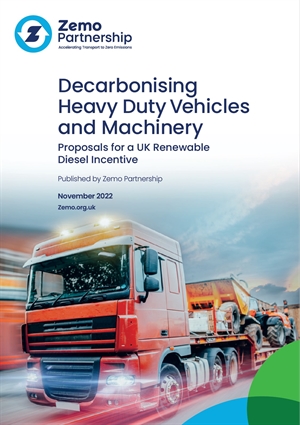Experts call for greenhouse gas-based fuel duty to deliver emissions gains in ‘hard-to-electrify’ heavy vehicles
Wed 16 November 2022
View all news

(Media release) New analysis by Zemo Partnership shows how a greenhouse gas-based fuel duty structure could encourage uptake of low carbon renewable fuels in hard-to-electrify transport applications and accelerate the transition to net zero.
The new study (‘Decarbonising Heavy Duty Vehicles and Machinery’) by Zemo Partnership, the public-private membership group driving transport decarbonisation, explores a pricing mechanism for a fuel duty discount and the potential GHG emission benefits of the use of high blend renewable fuels (HBRF) in heavy vehicles.
Heavy duty vehicles (HDV) and heavy non-road vehicles are applications for which the urgency to decarbonise is currently outpacing the availability, affordability and uptake of electric (or hydrogen) technologies. A 2021 report by Zemo, highlighted the opportunities to quickly decarbonise these vehicles using high blend renewable fuels such as biodiesel and hydrotreated vegetable oil (HVO), cutting GHG emissions by 85%-90% compared with standard fossil diesel when produced from biogenic waste feedstocks.
The 2021 study showed that with a market average of 30% HBRF, used in place of fossil fuels (diesel and natural gas) the sector could save an additional 46m tonnes CO2e over the next decade (equivalent to more than two years total UK emissions from HGVs based on UK Government statistics), with savings continuing to 2050.
The latest study builds on the earlier report, showing how a new structure for fuel duty could be developed to lower one of the key barriers that has been identified to the uptake of low carbon, sustainability-verified, renewable fuels.
For this report, supported by the Renewable Transport Fuel Association (RTFA) and UKPIA, Zemo carried out a comprehensive analysis of the whole-life costs for HDV and heavy non-road vehicle fleets running on renewable fuel compared with conventional (fossil-derived) diesel.
The team, supported by a range of Zemo members, developed a potential fuel duty structure to identify the ‘sweet spot’ where operators can make significant carbon savings at minimal cost to the Treasury, with duty reductions matching the value of carbon savings.
The study shows how a fuel duty discount could be set for a 100% renewable diesel fuel and scaled according to the bio-content in HBRFs . Fuels would only qualify for the incentive if approved under the Renewable Transport Fuels Obligation and produced from waste-based biomass feedstocks.
Commenting on the report, Elizabeth de Jong, CEO of UKPIA said: “Liquid fuels will be needed for a long time, especially for heavy duty vehicles where electric and hydrogen options aren’t yet ready. Low carbon liquids can reduce well to wheel GHG emissions by up to 90% now and can be delivered using our existing infrastructure.
“But to be attractive at scale to fleet operators, we need to see real incentives such as new duty rates that reward operators for using lower carbon fuels. I welcome this timely report from Zemo which assesses that changes to duty could offer a viable, early decarbonisation route for HDVs."
Gaynor Hartnell, Chief Executive of the RTFA said: “Bringing GHG emissions down rapidly is crucial and savings achieved sooner deliver more benefit, as CO2 build up in the atmosphere is cumulative. There is huge scope for increasing the blend levels used in heavy duty vehicles during the transition to electrification, and the earlier this starts the better.”
Zemo Partnership’s Head of Sustainability and one of the report authors, Gloria Esposito, said: “This latest study builds on our earlier work, which showed the immense potential for sustainability-verified renewable fuels to cut greenhouse gas emissions in the short and medium term.
“Our successful Renewable Fuels Assurance Scheme addresses one of the barriers to uptake but if we’re going to realise their full potential for GHG reductions, the financial hurdles to the adoption of these fuels will also need to be addressed.”
For more details, see the full media release.
Related Links
< Back to news list